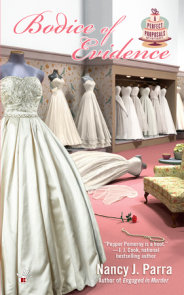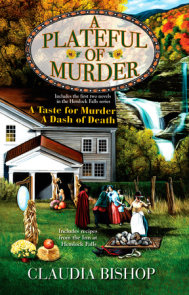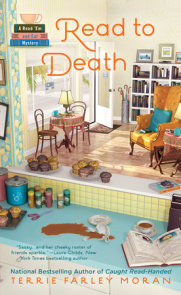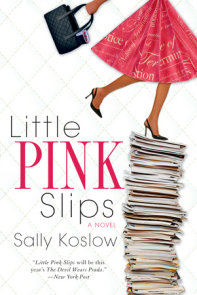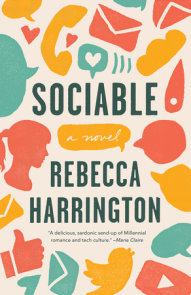READERS GUIDE
Questions and Topics for Discussion
AN INTRODUCTION TO CHARLENE ANN BAUMBICH’S DEAREST DOROTHY SERIES
It would be easy to say “Welcome to Partonville.” But a far better orientation for this little circle-the-square town in southern Illinois is coming up the road. See that dust cloud yonder? That’s Dorothy; or, as folks around here are fond of saying, Dearest Dorothy, coming into town from her beloved Crooked Creek Farm. Dorothy Wetstra—that’s like “wet straw,” only without the “w” at the end—is an eighty-seven-year-old oldster (as she calls herself) who serves as Partonville’s ambassador to the rest of the world. You might want to take a step away from the curb—once Dorothy climbs behind the wheel of her 1976 Lincoln, The Tank, the only thing that can stop her is a brick wall. Or maybe a garbage truck. Anyway, armed with her faith in The Big Guy (the one upstairs, as it were) and a positive attitude seasoned by her nearly ninety years in this small town, Dorothy is a walking wonder. Retired bandleader, genuine firecracker, and perpetual cheerleader, Dorothy is brimming with life. And, oh, what a life.
INTRODUCTION
With the hubbub of Thanksgiving over, Dorothy Wetstra is in the lap of luxury surrounded by family and relishing the news that her son Jacob is home for an extended stay. Even in a town where time seems to stand still, Christmas—always a big to-do around these parts—is just around the corner. But Partonville receives a hard blow as death again steals away with one of its own.
Amid their grief, Partonville’s citizens aren’t quick to shift their focus to merriment. And anyway, who would host the annual Happy Hookers’ Christmas party now that Dorothy’s moved to such a small house? Surely not that city slicker Katie Durbin, the one who snatched up Dorothy’s beloved Crooked Creek farm. Besides, would anyone even show up now that Katie’s land deals and mini-mall project have local businessfolk seeing red?
But Dorothy, armed with her Faith and impromptu pom-poms, reminds everyone that a party is the perfect spirit lifter. Plus, the occasion might help her show everyone how wonderful Katie really is. So with a little good cheer and even better fellowship, Partonville opens its circle-the-square heart to Christmas. There’s even a bit of mistletoe magic glinting in the eyes of young and old. For Dorothy, though, the big news is that a certain Partonville native might be coming home to roost—an early Christmas present sure to make Dorothy give thanks where thanks is due: to the Big Guy himself. So Merry Everything, Dearest Dorothy—and a happy new year!
ABOUT CHARLENE ANN BAUMBICH
Charlene Ann Baumbich is the author of the previous three books in the Partonville series. A popular speaker, journalist, and author, for several years she has lectured to women’s groups and retreats. Baumbich is also an award-winning journalist whose work has appeared in the Chicago Tribune, Today’s Christian Woman, and numerous other publications. She is the author of six nonfiction books of humor and inspiration.
A CONVERSATION WITH CHARLENE ANN BAUMBICH
You’ve recently done quite a bit of touring. In your travels, have you found your books strike a chord not limited to geographic region? Where have you been most surprised to find a fan base?
I guess one of the biggest and most delightful (and celebrated!) surprises was to be embraced in the deeper South as a Southern writer, especially since I’ve lived in the Chicago suburbs all my life and Partonville is only as far south as the “northern part of southern Illinois,” which, at least to my way of thinking, is decidedly the Midwest. But regardless of geographical locations—from the Dakotas, to the Deep South, to the East Coast, to Washington—readers tell me via e-mails and store appearances that I’ve nailed life in their town, or one that they used to live in or their grandmother lives in now. They are identifying more with the spirit of small-town life rather than its actual geographical location. One far-from-the-state-of-Partonville lady told me she was sure I’d written about her town. She also said she had to admit to liking the folks in Partonville better, though. I laughed out loud at that one!
What especially blesses me, however, is when someone takes the time to tell me a detailed story out of their past, something Partonville reminded them of, reawakened within them. Readers have shared some of the most precious, intimate, and hilarious moments of their lives with me. It’s humbling, really, and I hold their stories very close.
Partonville is a wonderful exploration of small-town America. Were you raised in a small town?
Although I’ve never lived in a town as small as Partonville (population about 1,500), through endless visits to relatives and dear friends I’ve grown familiar with the dynamics of small-town life. And I’ve been that visitor who took someone else’s stool at the counter (or unofficially “reserved” seat on the commuter train into the city!), the one driving the unfamiliar vehicle that makes everyone curious: Who are you and what are you doing in our town? I’ve also been that outsider kindly embraced into the fold, whether at a weekend retreat, into a church body or at a gathering of women or men who do lunch. Who I was raised by, I believe, is more important than where I was raised when it comes to small-town hospitalities: I was raised by parents who were inviting and accepting. A smile, a plate of fried chicken, and several rounds of storytelling were always more important than who you were or where you came from, the dust on your shoes, or your reputation.
Since I was a little girl, I guess you might say I’ve been a curious student of behavior. I’ve always loved people-watching, thinking about the lives in the houses behind the front porches. It’s my observation that people everywhere, even in large metropolitan areas, share the same need to feel connected. I believe it was Frederick Buechner who said that the story of any one of us is the story of us all. I think if you honor true emotions in a story, no matter what size the town, you’ll strike a familiar cord that resonates deep within people, tapping into a loneliness or wish, joy, or fear, and stirs our need for a sense of community.
If there’s one thing to be said for Dorothy Wetstra, it’s that her faith can surely move mountains (of mayhem and otherwise). How does your faith compare with Dorothy’s? Is she a role model created entirely from your own mind or is she a re-creation of a faithful child of God you’ve encountered in your own life?
How does my faith compare to Dorothy Jean Wetstra’s? I aspire to be Dorothy when I grow up, and one of the main reasons is because her default mode is to go straight to the Big Guy, whether it be to praise, wail, question, or duke it out. She trusts that God can take it and will respond with perfect love and timing for her life. Her faith-filled eyes give her endless hope and an exuberant kindness; she looks for the best in people, even those with whom she finds herself at odds. One of my favorite things about her faith is that when the wheels seem to fall off, she asks God to remind her about what she already knows, what she’s already heard God say and promise.
It would be fair to say there are similarities in our faith: we both trust God and understand how huge is God’s grace and mercy. (Honestly, if it weren’t for grace and mercy, I have no doubt I would have been smote about a gabillion times by now!) Of course there was a real Dorothy in my life—rather I should say there still is since her memory is a blessing forever and I continue to feel her hands on my shoulders all the way from heaven. She did have a strong faith. But Dorothy Wetstra’s faith is an eclectic blend made up of kind men and women I’ve known, wizened older folks I continue to seek out, sons and daughters of God who never forget their own Childness of God, who see more than is being said, pray for you before you’ve asked (and faithfully remember to do so when you do ask), don’t take themselves too seriously, and definitely enjoy God’s sense of humor.
How have Dorothy and the other residents of Partonville changed your outlook on aging?
Since I am a keen observer of behaviors, let me say I’ve witnessed many ways to age. Some oldsters have been graceful, and grace filled every step of the aging process; others have been perfect models of negativity, always focusing on what’s wrong rather than what’s right, what they don’t have rather than what they do; how they used to do it compared to “those kids today.” Ironically, perhaps those folks have taught me the most, which is to magnify for me what I don’t want to be.
One of my best friends has quite a few years on me. She is active, spunky, age-appropriately stylish, involved in her church, a woman with a true servant’s heart, one who models a keen interest in the arts, and she loves her God. She loves to laugh, as did the real Dorothy. As did my mother, whom I lost when she was only fifty-six and I was thirty. Up until my mom’s early death, she aged—inside and out—gracefully. Laughter and the giving of love keep a heart young and merry. My mom was warm and kind and kept her priorities in order. Since the older I get the more I look like my mom, I find my own physical aging process fascinating. I will continue to look in the mirror to catch glimpses of what she might have looked like had she aged to . . . whatever age I might live long enough to be. And I am always inspired by intergenerational relationships. Always.
Having said all of this, I see that rather than Partonville folks modeling something to me about aging, I’d say they are the voice of what I’ve already seen modeled in my life, and that is that aging is what you decide it will be. If you spend all your time fretting about vanities and complaining about everything, aging will be about vanities and negativity. If you spend your time seeking to shine God’s Light into the world no matter what your circumstances, then your aging will be about Light.
Dorothy says, “God is a God of constant surprises.” Do you think faith is important for “going with the flow” and adjusting to the ever-changing world?
Since God is the only sovereign thing on which I can truly rely, my faith in God and God’s ability to make sense out of the senseless is the only way I know to go with the flow and enjoy the ride!
Dorothy’s penchant for speed and erratic driving seems unusually authentic. If you don’t mind, how is your own driving record?
I’ve been driving for more than four decades. (As of this writing, I’m heading toward fifty-nine.) I only have one speeding ticket to my name and that was acquired about thirty-five years ago. Although I do like to take off fast and need to feel a car kick into passing gear when I put my foot on it (and I mean now!), have owned two motorcycles (ridden horses in barrel races), and still am jazzed by the sound of a big engine (Harley-Davidson or any other engine that goes vroooom-vroooom, rumble-rumble!), I’m oddly not a huge speeder. My mom, however, was often driving on her limit of tickets; my dad enjoyed the wind in his face. Both of my sons own motorcycles, the oldest definitely enjoying any experience—engine-related or not—that goes fast, whether it be driving, skateboarding, snowboarding, bicycling, etc. We all love(d) to feel the power. Feel the “edge” of . . . whatever. It’s in our genes, I guess. And the real Dorothy . . . yikes! She scared the living daylights out of me when she drove everywhere fast . . . even in reverse! Her unapologetic and complete explanation to me as to why she had a dent in her house in front of where she parked her car was “That was the last time I bought a car with turbo charge.”
Your depictions of nature reveal a love for the land. Are you outdoorsy at all?
I love the outdoors (unless it’s too hot and then I’m a hopeless whiner). I see beauty in straight rows of corn, which I learned to appreciate when my grandfather, a farmer, pointed them out as he slowly drove down the hard road observing such things. I love the sounds of a creek, wind in Ponderosa pine trees, the whir of hummingbird wings, the moo of a cow, the happy chirp of crickets, and the goose-bumpedy strains of mourning doves and coyote howls. I oooo and ahhhh at sunsets and sunrises, comets and sparkling rocks, falling leaves and the pattern of ice on a window because my parents were always saying, Look at that! Listen to that! Ain’t that perty? (my dad’s unique expression). I am sensory loaded, nerve endings automatically honing in on the tiniest detail of a flower and the vast grandeur of the mountains. I cannot help but inhale the fragrant scent of petunias (Yes, they do smell. Try it!), horse sweat, freshly mowed fields, and puppy breath. Each of these things is such a pure and free gift.
After raising two sons, you are able to capture the confusion and angst present in many teenage boys. Does writing from a boy’s point of view give you any trouble?
None. I didn’t try to think like a teenage boy; whatever rings true about that was just there. I’m not sure what that says about me, but it’s the truth. Like I’ve said, I’m a keen observer. But maybe I didn’t have trouble writing like a boy because as a girl, I never did understand tea parties where friends would drink air tea when they could just go get a soda. I much preferred crawdad hunts and worm forts (I do not recommend putting swimming pools in them—not pretty) to dolls and lace. But now, as a “fully growed woman,” as my grandmother would have described it, don’t even think about messing with my earrings or lip gloss or I’ll slam-dunk you! (Just kidding. About the lip gloss. Maybe.)
What are you working on now?
I’m currently working on number five in the Dearest Dorothy series, then I’ll be working on my next nonfiction, which is a topic I’ve been speaking on since 1991, “Don’t Miss Your Life!”
DISCUSSION QUESTIONS
- After letting her sixteen-year-old son Josh take a road trip alone, Katie nearly worries herself to death when he’s late returning. Think of times in your life when you were as worried about someone not showing up as Katie was about Josh. When everything turned out okay, was it anger or relief that won out in the end? If Katie had come to you and asked your advice on whether or not to let Josh take the trip, what would you say to her?
- Dorothy and Jacob have a wonderful time reminiscing about the contents of a few boxes still unpacked after her move. Can you think back to a time when you and a loved one went through a “rainy day” box? What long-lost treasures have you found lurking in closets or old cedar chests?
- Partonville’s citizens seem to take one step forward and two steps back where their trust in Katie Durbin is concerned. What experiences have you had being an outsider? In what ways have such experiences altered the way you treat a newcomer to your neighborhood or office?
- Jacob gets a bit wistful when he notices there are no young people to be found around the square. A lot of small towns wrestle with this problem and try to think of ways to encourage young people to stay. If you were on a planning commission for a small town, what strategies would you employ? What resistance to changing the status quo would you expect? Did you settle in, or even return to, your hometown? Why or why not?
- When Pastor Delbert finishes a silent prayer, Dorothy, for a second, seems to be a mouthpiece for God. What similar experiences—a prayer answered more obviously than usual—can you recall? Did the answer come as a relief or as a bit unsettling?
- Oftentimes, we get caught up in the trappings of holidays rather than in the true spirit of the season—even ending up in a “100 percent tizzy.” Dorothy, for example, is nervous about having to downsize her Christmas tree. What are the things you simply cannot do without during the holidays—a favorite ornament, an heirloom decoration? Are all of these things really necessary for enjoying the holiday? Now imagine one of them being taken away. Which would be easiest to part with?
- Several characters in this book are in the early stages of a courtship—some in their sixties and some barely sixteen. What are the similarities in the way these new romances are playing out? What are the differences?










